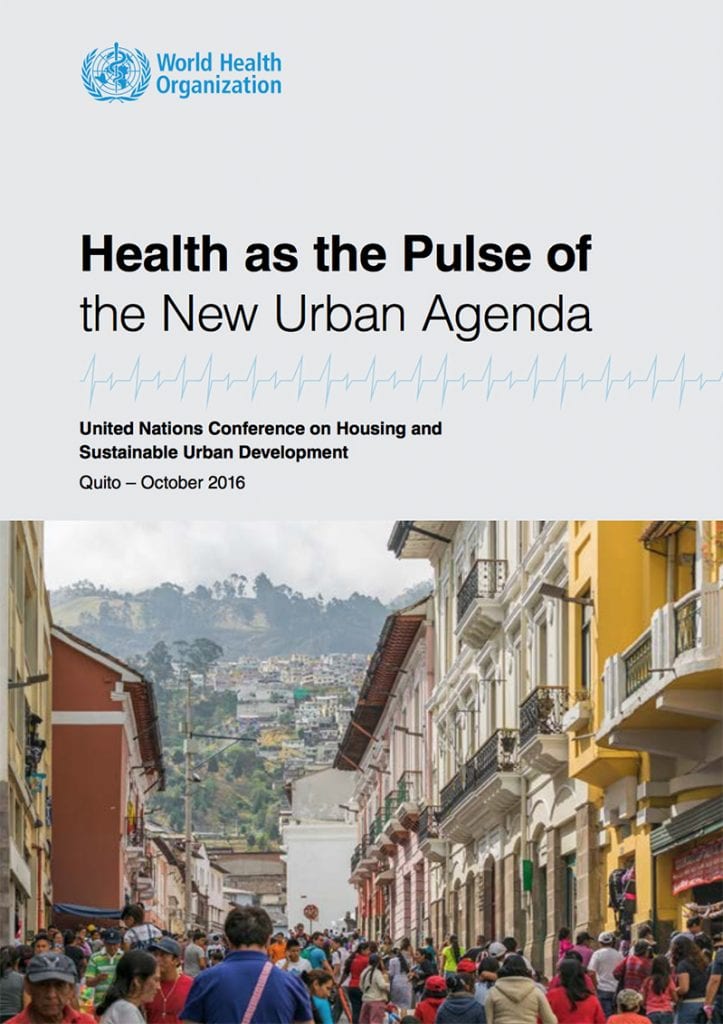Health as the pulse of the New Urban Agenda
The new WHO report “Health as the pulse of the New Urban Agenda – United Nations Conference on Housing and Sustainable Urban Development” (PDF) considers how to integrate health into urban planning, investments, and policy decisions, so as to support the implementation and achievement of the goals and objectives of the New Urban Agenda.
Alcohol harm is mentioned only once, meaning WHO missed an opportunity to highlight how alcohol hinders urban development and undermines resilient, inclusive, safe cities for all. Likewise alcohol policy measures are addressed only once in the report but at least in a robust way, highlighting the role of alcohol taxation and alcohol advertising bans.
Two core themes
Two core themes run throughout this report.
- To realize Habitat III’s collective vision of sustainable, liveable and economically vibrant cities, urban decision-makers must apply a “health lens” – to fully assess the risks and opportunities posed by their policies and programs, and measure their effects.
- Achieving truly sustainable urban development will require much greater cross-sectoral coordination to protect and improve the health of vulnerable populations in the world’s fast-growing urban areas.
Healthy cities are socially inclusive – i.e. places where planning and policy-making incorporate the views, voices and needs of all communities and inhabitants.
The importance of health for urban development
Health is not only an indicator for monitoring progress, but a fundamental driver of sustainable development. Focusing on health can unlock progress to reduce inequalities in urban areas, and expand access to services and opportunities
Health is essential for fostering good livelihoods, building a productive workforce, creating resilient and vibrant communities, enabling mobility, promoting social interaction, and protecting vulnerable populations.
Alcohol, health and urban development
Alcohol is a major risk factor for ill-health, and an obstacle to sustainable urban development. The pervasive presence of alcohol makes public spaces less safe, less inclusive, less enabling and less diverse. Especially youth and women are excluded from life happening in the public realm because of alcohol-induced risks.
However, the report addresses alcohol only twice.
The main risk factors for NCDs (tobacco use, alcohol use, physical inactivity, poor diet, exposure to air pollution and chronic stress) are directly influenced by urban design and planning policies that are far beyond the control of individuals.”
In this context, the report fails to adequately address alcohol as a risk factor for promoting urban health and as an obstacle to sustainable urban development – for example considering pervasive violence against women in public spaces or the negative impact on communities of omnipresent alcohol marketing; or the problems associated with high density of alcohol outlets.
Nevertheless, there is a good passage in the report:
Cities have the authority and capacity to make urban environments healthier, through taxes on the consumption of, and restrictions on advertis- ing for, tobacco products, alcohol and unhealthy foods.”
Evidence shows that alcohol policy measures, such as the three best buys of regulating affordability, decreasing availability and banning advertising, are crucial tools to help boost urban development.
—
For further reading
 Download the full WHO report (PDF)
Download the full WHO report (PDF)
Blog post:
“Building cities for all through alcohol policy”
IOGT International booklet:
“Alcohol policy for the New Urban Agenda”
Fact Sheet:
“All dressed up and nowhere to go”